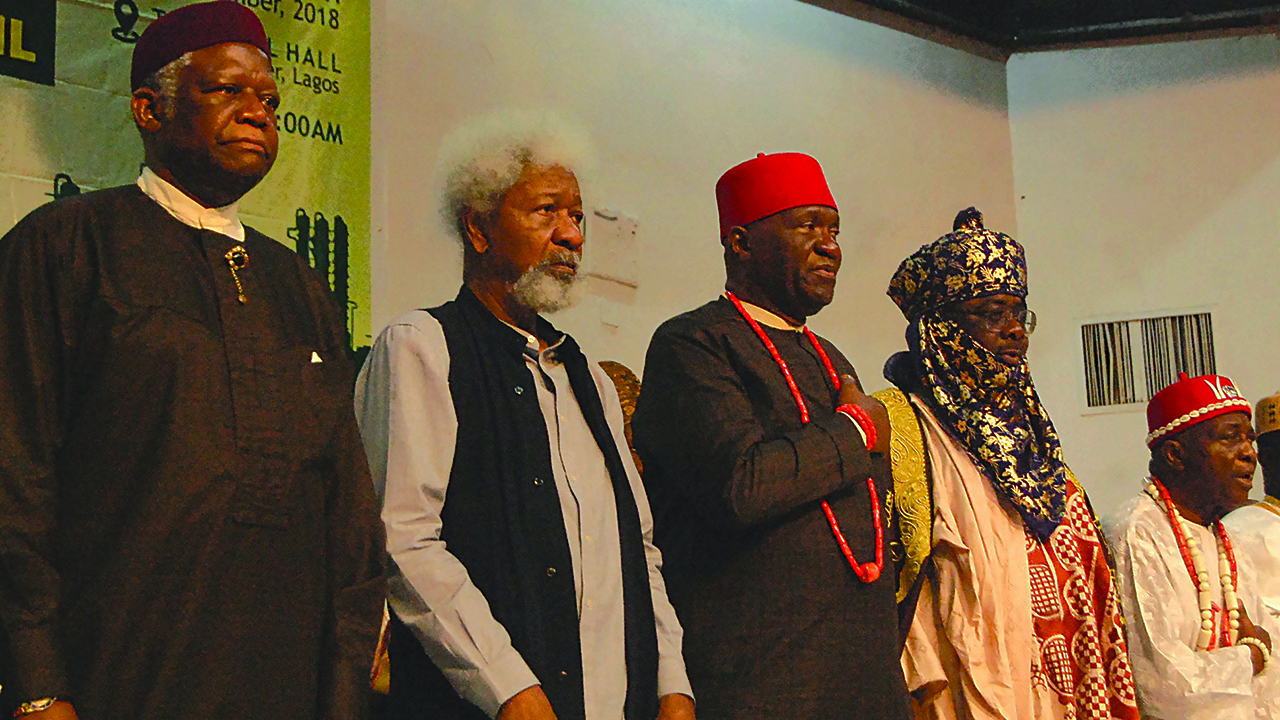Chairman of the occasion, Gen. Ike Nwachukwu (left); Nobel Laureate, Prof. Wole Soyinka and President General, Ohanaeze Ndigbo, Chief John Nwodo; representative of Emir of Kano, Alhaji Mohammed Dalihatu and Chief Guy Ikokwu at the Handshake Across Nigeria with the theme, “Nigeria Beyond Oil,” in Lagos…yesterday.
Prominent Nigerians have restated calls for restructuring the country with Nobel Laureate Wole Soyinka insisting the move is unstoppable.
“A methodological way of stopping the bloodbath in the country is to reconfigure the nation. And nobody has the right, either through body language or any other means, to say no,” Soyinka said during the Handshake Across Nigeria summit organized by Nzuko Umunna/Aka Ikenga and Core Federalists in Lagos yesterday.
He noted: “States must be given maximum control over their resources. There are some who prefer to grow rice. There are others who prefer to grow religion and we know where religion has brought us today. If some people prefer to grow rice and others want to grow Sharia, then both sides should be given the means to develop.”
 Also at the event themed ‘Nigeria Beyond Oil’, were former Minister of External Affairs Ike Nwachukwu, President General Ohanaeze Ndigbo John Nnia Nwodo, Afenifere chieftain Ayo Adebanjo, and President Middle Belt Forum Pogu Bitrus.
Also at the event themed ‘Nigeria Beyond Oil’, were former Minister of External Affairs Ike Nwachukwu, President General Ohanaeze Ndigbo John Nnia Nwodo, Afenifere chieftain Ayo Adebanjo, and President Middle Belt Forum Pogu Bitrus.
In his welcome address, Nwachukwu dismissed the concern that some states would get unfair deals in a restructured Nigeria. “There is no state without the basic requirements for economic and human capital development. The fear, therefore, that some states would be disadvantaged under this arrangement would be removed because the Federal Government would intervene directly or through loans to the federating units to realize their developmental projects.”
He explained that states would not be able to misappropriate such funds, as people would rise against any attempt to misapply the commonwealth. Consequently, unemployment, agitations from ethnic groups, insurgency, kidnappings, armed robbery, and ritual killings would be reduced to the barest, he said.
He further urged the Independent National Electoral Commission (INEC) to be truly independent as the 2019 general elections draw closer. According to him, though the government set up the commission, it is responsible only to the people. To make INEC truly independent, he said, there is the need to review the way its members are appointed.
“In the United Kingdom, for instance, the Speaker’s Committee appoints the electoral officers drawn from the political parties. Currently, of the total 10 members, appointed and ex officio, there are four Conservatives, three Labour and one Scottish Nationalist (excluding the Speaker). The body reports to the parliament and not to the Prime Minister, thereby making them truly independent and representative.
“The chairman is not appointed by the Prime Minister but by the Speaker’s Committee, thereby insulating him or her from any direct influence by the Prime Minister and in our case, the president or anyone acting on behalf of the president. Nigeria should do the same.”
Nwodo, on his part, said it was disheartening to see the Federal Government assuming responsibilities such as education, health, and agriculture, which states could effectively discharge. “The usual response to this observation is that states are not even now able to pay their workers. What is not acknowledged is that the resources that the Federal Government corners for itself, now, would have to be released to the states when they take on these duties,” he said.
He added: “Those campaigning against restructuring have painted an unfortunate and untrue picture that those of us in support are going to deny the northern states, who do not yet have any proven oil reserves, the ability to survive.
“This is unfortunate. The new model we propose for Nigeria will drastically reduce corruption, as the large federal parastatals, which gulp government revenue for little or no impact, dissolve and give way to small and viable organs in the new federating units.”
Adebanjo, in his goodwill message, condemned the stance of President Muhammadu Buhari and Vice President Yemi Osinbajo on restructuring. “They are trying to distort what restructuring is. They don’t understand themselves. The president says one thing; the vice president says another. Unfortunately, I can understand that of the president; education is necessary to understand restructuring.
“But what disappoints me is the vice president who is a professor of law, trained with a very good background, yet he doesn’t understand. To show you how deceitful they are, how can the Osinbajo say he wants devolution of power, state police and yet he doesn’t understand restructuring? It is not a philosophy,” said Adebanjo.
Former President Olusegun Obasanjo meanwhile restated optimism about the nation.
At a meeting with executive members of the Delta State Traditional Council yesterday, he described his optimism as “incurable.” He said although the country lacks perfection, it nevertheless “can be made to make progress and move at a pace that will be advantageous to all of us, no matter our tribe, position, gender, and race.”
He said further: “We can have a country that is at peace with itself, where unity is enthroned; a country where everyone will be his brother’s keeper; where performance will be obvious in governance and running of the affairs of our people; a country where everyone will have a sense of belonging.”
Obasanjo also commissioned some projects executed by the Governor Ifeanyi Okowa-led administration.











